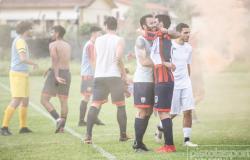Alessandra Locatelli in Foligno. The meeting with the Minister for Disabilities of the Italian Republic took place on Tuesday 30 April in the “San Domenico” auditorium in the presence of the Umbrian associations. A moment of discussion and debate, on the occasion of which not only representatives of the associations intervened, but also parents and family members of people with disabilities. Meeting during which various topics were addressed, such as that of the implementing decree on the Life Project which will make the rights already established by the UN convention enforceable and the issue relating to the first G7 on inclusion and disability which will take place in Umbria.
Before going inside the auditorium for the official meeting, Locatelli dedicated a few minutes to answering questions from the press, first of all declaring that “there is a lot of anticipation and curiosity also for the entry into force of the Life Project , an innovative tool that will require a widespread and detailed training course to try to train all those who work in the area at the service of people with disabilities”.
But what is the timeframe for implementing the plan?
“The trial will start in nine Italian provinces from 1 January 2025 – explained Locatelli -. Important news is the decision to propose Perugia as one of the provinces in which to carry out the experimentation. A proposal, already shared with the minister Orazio Schillacci, the INPS and the Ministry of Labour, which we hope will be positively received when presented at the Conference of the Regions”.
In these hours, President Mattarella made a reminder, underlining that there is still a lot of difficulty for disabled people in the world of work…
“Yes, there are still difficulties – replied the minister – to give dignity to people’s lives it is necessary to activate training and work inclusion paths, also taking into account the housing, well-being and health dimensions. It is necessary to do a job moving from welfare to the idea that in every person there is value and talent in which we can invest as institutions, the private world and individual citizens”.
Minister, an online petition from a teacher asks to withdraw Vannacci’s European candidacy, 8,000 signatures have already been collected…
“Everyone has the right to express themselves as they wish – declares the representative of the Ministry -. General Vannacci had the opportunity to clarify his position which had not been understood. I have already expressed what the position of Italy and the League is on the issue of school inclusion. Italy is one of the few countries that has a law on school inclusion, other very important countries, unlike us, still have separate classes”
The “San Domenico” meeting was attended by, among others, the president of the Umbria Region Donatella Tesei, the president of the Regional Disability Observatory Paola Fioroni, the councilor for Health and Social Policies of Umbria Luca Coletto, the mayor of Foligno, Stefano Zuccarini.
“In Umbria we are pursuing targeted policies – underlined Donatella Tesei – and it is a Region that always makes inclusion a distinctive feature. Thanks to our minister we are planning this extremely important event for our region, the first G7 in general in Umbria but the first to deal with issues of this type”.
Stefano Zuccarini also spoke: “The G7 will be a very important event, on the occasion of which Italy will bring the issue of disability to the attention of the whole world. On this ‘easy game’ – continued the mayor of Foligno – as a disabled person, I can say that attention must be high and disability treated as normal, which means dedicating particular attention to those who do not have the same possibilities”.
Minister Locatelli then proceeded to explain the planned projects in more detail: “With the G7 which will take place in Umbria we will discuss inclusion and disability to put people’s lives at the centre, so much so that the subtitle of the event is ‘The right of everyone to full participation in the civil, social and political life of our countries’. Participating in the meeting, which will take place in Assisi on April 14th, will be ministers from all over the world who will gather in the square and not in a building – Locatelli underlined – to discuss a topic that concerns everyone and belongs to everyone. A fundamental point that must be kept in mind are the abilities and skills of the people who operate in the world of the third sector and associations at the service of others. We need – he continued – to make a great leap in quality and civilisation, to move from welfare, which was fundamental for the creation of our services, to a model of valorisation of the talents and skills of each person, which allows us not to discriminate but rather to strengthen our communities. There is an important opportunity for change which is manifested through the implementing decree of the enabling law on the Life Project, through which we are also going to undermine the care of people with disabilities which is fragmented between the healthcare, social and healthcare worlds and the social one. I want to remember that the person is one, around whom all the specters of daily life must revolve. Each of us – she then concluded – needs a social and recreational life, needs affection, friendships, needs to have fun, play sports and these must be rights guaranteed to everyone”.
These were followed by interventions by associations and families of people with disabilities who reported the difficulties they experience every day, regarding assistance, the relationship with institutions and social inclusion. Among these is the testimony of Gabriella Formenti: “I am the grandmother of a 12-year-old child suffering from severe autism, I am part of a group of families for rehabilitation, we know very well the dynamics, the suffering and the shortcomings, especially those linked to services that do not there are, and expenses that, as families, we are unable to support, getting into debt. We also encounter problems every day related to assistance, given that we are unable to find trained staff, and if we do find one they often stay for a short time, a deleterious aspect for people with autism. There are many problems that concern us related to inclusion. Not least – she concluded – was the event that saw us involved to allow my nephew, who was rejected by the school, to participate in a school trip, on the occasion of which I had to contact the institutions directly”.






